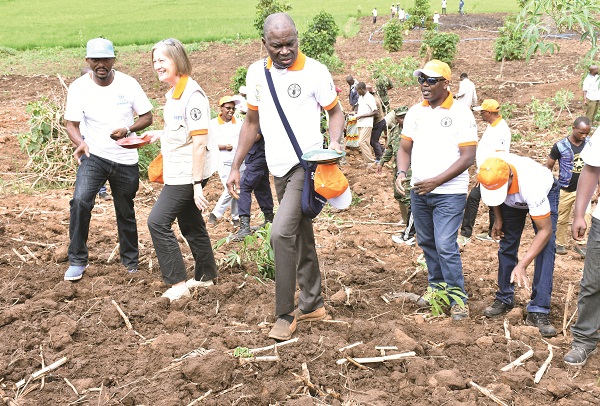
By FAO;
The World Food Day (WFDAY) is for us a good opportunity to reflect on how to take measures and actions that would prevent or minimize the impact of human conflicts, the climate change and extreme poverty on national food security, according to Gualbert Gbehounou, FAO Representative in Kirehe District at the celebration of WFDAY 2018. It was last Friday, 26 October. Read his message below:
The United Nations Rome-based Food Agencies (FAO, IFAD, WFP) are delighted to be here today at Gatore sector, in Kirehe District, on the occasion of the 2018 World Food Day observance, organized by the Ministry of Agriculture and Animal Resources (MINAGRI) , in partnership with the District Authorities, the UN Rome-Based Food Agencies (FAO, IFAD, WFP) and other partners.
The global theme of this year’s World Food Day is “Our actions are our future. A zero hunger world by 2030 is still possible”. The Government of Rwanda has confirmed that the same theme is relevant at national level.
Just three years ago, in September 2015, all United Nations Member States approved the 2030 Agenda for Sustainable Development. The eradication of hunger and all forms of malnutrition (Sustainable Development Goal number 2) was defined by world leaders as a cardinal objective of the Agenda, a sine qua non condition for a safer, fairer and more peaceful world.
Paradoxically, global hunger has only grown since then. According to the latest estimates, the number of undernourished people in the world increased in 2017, for the third consecutive year.
Last year, 821 million people suffered from hunger (11 percent of the world population – one in nine people on the planet), most of them family and subsistence farmers living in poor rural areas of sub-Saharan Africa and Southeast Asia. At the same time, the proportion of adult obesity continues to rise, from 11.7 percent in 2012 to 13.3 percent in 2016 (or 672.3 million people).
The World Food Day is for us a good opportunity to reflect on how to take measures and actions that would prevent or minimize the impact of human conflicts, the climate change and extreme poverty on national food security.
We are pleased to note that all strategic documents related to the prosperity of Rwandans by 2030 have been validated; including the National Strategy for Transformation (NST1 – 2018-2024), National Agricultural Policy (NAP 2017-2030) and the Fourth Strategic Plan for Agriculture Transformation (PSTA 4) approved by the Cabinet resolutions of July 11th, 2018.
This planning process would serve to address major gaps identified in Agriculture during the last cycle of implementation of Government priorities (2013-2018); which include solutions related to innovations and research; building resilience of Agriculture in climate change environment, nutrition-sensitivity of Agriculture, gender mainstreaming, private sector-led, small scale irrigation development, interesting youth in agriculture, etc.
Ladies and Gentlemen,
Achieving the Sustainable Development Goals (SDGs) to end hunger and extreme poverty by 2030 will depend crucially on developing rural areas, where over 70 per cent of the population lives in Rwanda. In fact, The Government has the most fundamental role in achieving Zero Hunger by ensuring that vulnerable people have sufficient income to buy the food they need, or the means to produce it for themselves. The leaders of our three Organizations, FAO, IFAD and WFP, made strong pleas, on the occasion of WFD celebrations in Rome. They all pleaded for action, with more determination, partnership and solidarity.
Ladies and Gentlemen,
As we commemorate World Food Day 2018here in Gatore Sector, let us salute the Rwandan family farmer’s efforts, and their laudable contributions to achieving the national socio-economic goals and sustainable food and nutrition security.
The efforts underway must be accelerated and up scaled, in order to achieve the tight SDGs targets, notably SDG2 – End hunger, achieve food security and improved nutrition, and promote sustainable agriculture.
I will conclude my remarks by renewing our availability to complement the national initiatives and efforts towards food and nutrition security. “Zero Hunger, is still achievable if we join forces across nations, continents, sectors and professions, in the remaining years for 2030. “ Taking action is not an option,it isa necessary step to a truly sustainable future for all.
Murakoze Cyane. Thank you. Merci.
